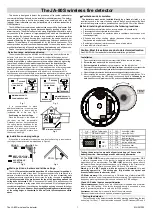
ACCURACY CONSIDERATIONS
KI7000 UM-5
-
25 -
DWDM Loss and Power Measurements
The DWDM bands are typically within 1525 ~ 1610 nm band. For this
application, an InGaAs detector calibrated at 1550 nm gives good
absolute accuracy at all DWDM wavelengths. Testing optical loss at
1610 or 1625 nm is common, since this represents the worst case
attenuation in most systems.
High power InGaAs detectors may be required to measure the
system power level.
CWDM Loss and Power Measurements
The CWDM band is from 1270 ~ 1610 nm at 20 nm spacing,
however, 1490 ~ 1610 nm is more common since it avoids the water
absorption peak at 1383 nm.
The most common operating wavelengths for FTTH PON systems
are currently 1310 / 1490 / 1550 nm.
As in DWDM application, an InGaAs detector gives good absolute
accuracy.
Because of the broad operating wavelengths encountered, the power
meter calibration wavelength needs to be matched to the measured
wavelength, or absolute errors may be excessive.
Many systems are measured at 1390 nm to test for the water peak,
and at 1625 nm to measure the high end attenuation limit.
At 1625 nm, the fiber attenuation is actually very sensitive to
wavelength, since the silica infra-red absorption zone is reached. So
the wavelength tolerance of this particular laser is a major issue,
especially since many older source instruments have a tolerance of
30 nm.
Summary of Contents for KI7300 Series
Page 1: ......
Page 57: ...QUICK REFERENCE GUIDE KI7600C Series Optical Power Meter KI7000 UM 5 55 ...
Page 59: ...QUICK REFERENCE GUIDE KI7400C 7800C Series Optical Light Source KI7000 UM 5 57 ...
Page 62: ...QUICK REFERENCE GUIDE KI7300C 7700C Series Loss Test Set KI7000 UM 5 60 ...
Page 64: ...NOTES KI7000 UM 5 62 ...
Page 65: ...NOTES KI7000 UM 5 63 ...
Page 66: ...NOTES KI7000 UM 5 64 ...
















































